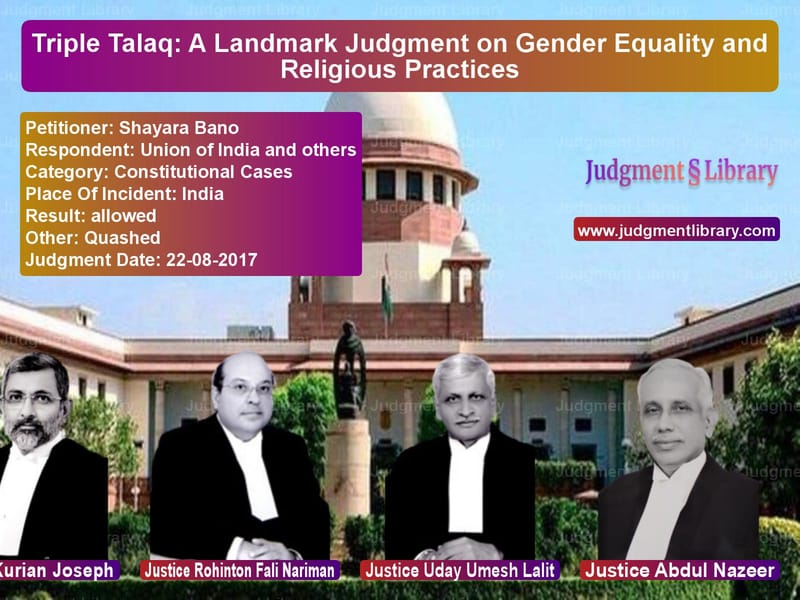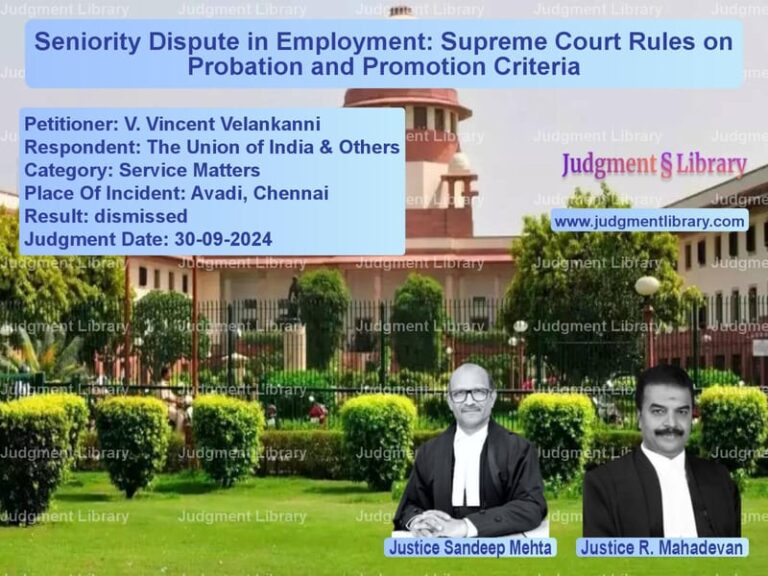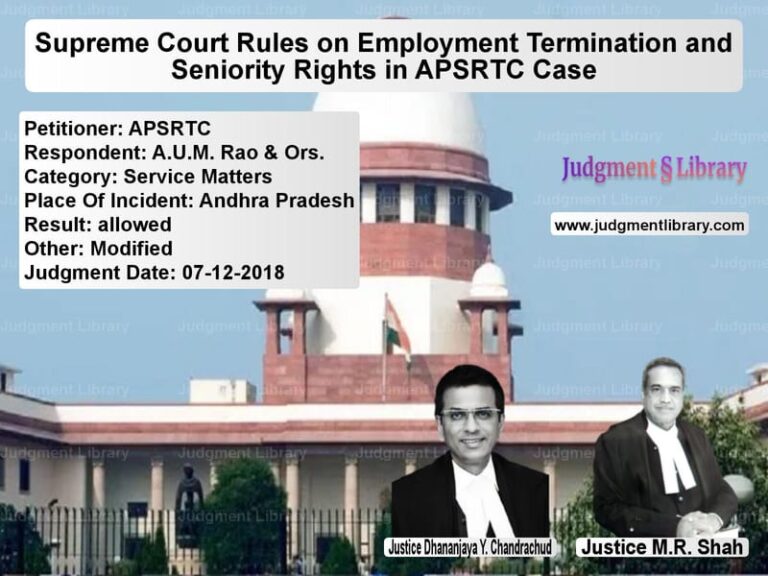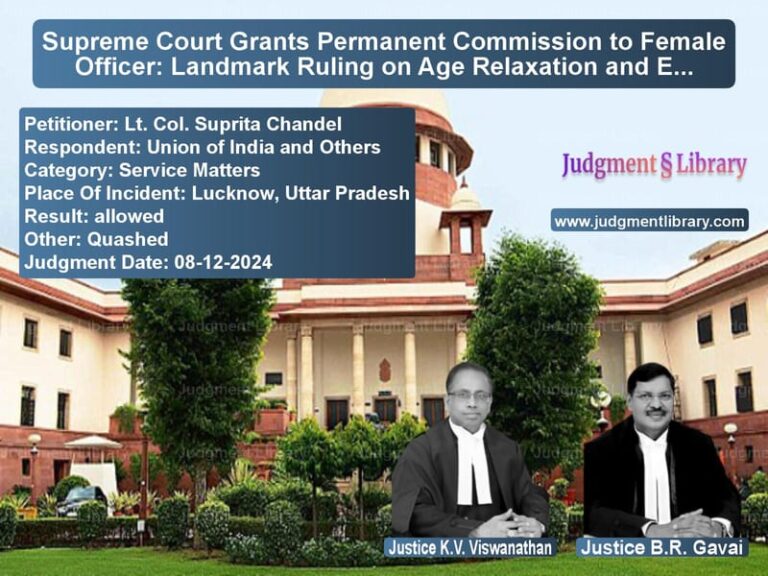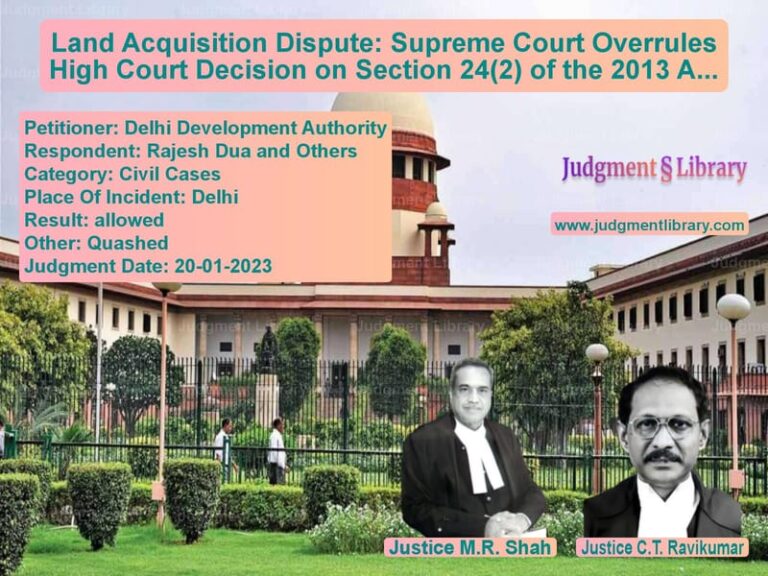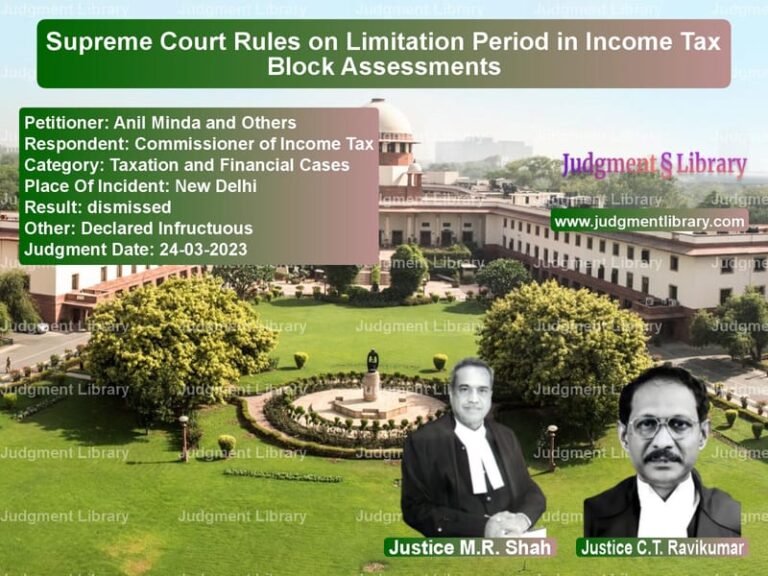Triple Talaq: A Landmark Judgment on Gender Equality and Religious Practices
The case of Shayara Bano v. Union of India is one of the most significant judgments in India’s legal history, addressing the practice of talaq-e-biddat or triple talaq. This case challenged the constitutional validity of the practice that allowed Muslim men to divorce their wives instantaneously by pronouncing ‘talaq’ three times, often in one sitting. This practice, long debated, raised concerns regarding gender justice, religious freedom, and constitutional principles of equality.
The judgment, delivered on August 22, 2017, was a 3:2 majority ruling that struck down triple talaq as unconstitutional. The Supreme Court held that this practice was arbitrary, violated fundamental rights, and was not essential to Islam. The case marked a turning point for Muslim women’s rights in India and set the stage for subsequent legislative action to criminalize instant triple talaq.
Background of the Case
The petitioner, Shayara Bano, was married for 15 years before her husband divorced her through triple talaq in 2016. She approached the Supreme Court, contending that the practice was unconstitutional as it deprived women of their fundamental rights. Alongside her petition, other Muslim women, organizations, and the central government also sought a judicial ruling on the matter.
Triple talaq has been practiced for centuries among Sunni Muslims following the Hanafi school of thought. However, it has been banned in several Muslim-majority countries, including Pakistan, Bangladesh, Turkey, and Indonesia. The question before the Court was whether India, a secular democracy, should allow such an arbitrary and unilateral form of divorce that placed women at a significant disadvantage.
Key Legal Issues Raised
- Whether triple talaq violated Article 14 (Right to Equality) of the Indian Constitution.
- Whether the practice was protected under Article 25 (Freedom of Religion).
- Whether triple talaq was an essential religious practice in Islam.
- Whether the judiciary had the power to intervene in personal laws.
Arguments by the Petitioner
The petitioners, including Shayara Bano and women’s rights organizations, argued that triple talaq was unconstitutional because:
- It violated Article 14 by treating Muslim women unequally compared to Muslim men, who could divorce with proper procedure.
- It violated Article 15, which prohibits discrimination based on gender.
- It violated Article 21 (Right to Life and Personal Liberty), as instant triple talaq left women without financial security or dignity.
- It was not an essential part of Islam and was not sanctioned by the Quran.
- Most Islamic nations had abolished the practice, proving that it was not intrinsic to the religion.
Arguments by the Respondents
The All India Muslim Personal Law Board (AIMPLB), defending triple talaq, argued:
- The judiciary had no right to interfere in religious matters protected under Article 25.
- Personal laws had been historically protected from judicial scrutiny.
- While triple talaq might be undesirable, it was legally valid and had been practiced for centuries.
- It was better to allow instant divorce rather than force couples to remain in unhappy marriages.
The Supreme Court Judgment
The five-judge Constitution Bench of the Supreme Court delivered a split 3:2 verdict. The majority, consisting of Justices Rohinton Fali Nariman, Uday Umesh Lalit, and Kurian Joseph, held that triple talaq was unconstitutional, arbitrary, and violated fundamental rights.
Justice Nariman and Justice Lalit: “Triple talaq is manifestly arbitrary as it allows a Muslim man to break down a marriage whimsically and capriciously. This violates Article 14 of the Constitution.”
Justice Kurian Joseph: “What is bad in theology is bad in law. The Quran does not sanction instant triple talaq.”
The minority opinion, given by then-Chief Justice Jagdish Singh Khehar and Justice Abdul Nazeer, suggested that Parliament should be given the responsibility to legislate on this issue instead of the judiciary striking it down.
Impact of the Judgment
The ruling had far-reaching consequences:
- It declared triple talaq unconstitutional and invalid in India.
- It laid the groundwork for legislative intervention to criminalize the practice.
- It strengthened women’s rights and equality in marriage and divorce.
- It reinforced that personal laws must conform to constitutional principles.
Legislative Action Post-Judgment
Following the judgment, the Muslim Women (Protection of Rights on Marriage) Act, 2019, was enacted. The law:
- Declared triple talaq a cognizable offense, punishable by up to three years in prison.
- Allowed Muslim women to seek maintenance and custody of children post-divorce.
- Provided legal recourse to victims of triple talaq.
Reactions to the Judgment
The judgment received widespread support from legal experts, women’s rights activists, and politicians who viewed it as a progressive step toward gender equality. However, some religious organizations criticized the ruling, arguing that it interfered with Islamic personal law.
Conclusion
The Shayara Bano v. Union of India case was a defining moment in India’s legal history, reinforcing that religious practices must align with constitutional values. By striking down triple talaq, the Supreme Court upheld the principles of gender equality, personal dignity, and justice.
This ruling ensured that Muslim women were no longer at the mercy of an arbitrary and unilateral divorce practice. It reaffirmed the importance of constitutional rights over religious customs, setting a precedent for future legal reforms aimed at protecting women’s rights.
Don’t miss out on the full details! Download the complete judgment in PDF format below and gain valuable insights instantly!
Download Judgment: Shayara Bano vs Union of India and o Supreme Court of India Judgment Dated 22-08-2017.pdf
Direct Downlaod Judgment: Direct downlaod this Judgment
See all petitions in Fundamental Rights
See all petitions in Public Interest Litigation
See all petitions in Separation of Powers
See all petitions in Judgment by Jagdish Singh Khehar
See all petitions in Judgment by Kurian Joseph
See all petitions in Judgment by Rohinton Fali Nariman
See all petitions in Judgment by Uday Umesh Lalit
See all petitions in Judgment by S. Abdul Nazeer
See all petitions in allowed
See all petitions in Quashed
See all petitions in supreme court of India judgments August 2017
See all petitions in 2017 judgments
See all posts in Constitutional Cases Category
See all allowed petitions in Constitutional Cases Category
See all Dismissed petitions in Constitutional Cases Category
See all partially allowed petitions in Constitutional Cases Category

